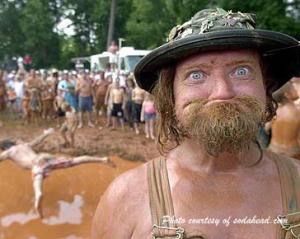
Say the word “redneck” and you never know what reaction you’re going to get.
The word has a confusing role in our lexicon. The American Heritage Dictionary lists “redneck” as “a disparaging term for a member of the white rural laboring class, especially in the southern United States,” and secondly as, “a white person regarded as having a provincial, conservative, often bigoted attitude.”
Yet, many people proudly consider themselves rednecks, believing it signifies someone who is a straight-shooter–trustworthy people with old-time values, who view sophistication as pretentious snobbery.
“Redneck” first appeared in the 17th century, when Scottish Covenanters, or supporters of the National Covenant, signed documents stating that Scotland desired the Presbyterian form of church government and would not accept the Church of England as its official state church. Many signed in their own blood and wore red pieces of cloth around their necks as distinctive insignia, hence the term “red neck,” which became slang for a Scottish dissenter. Many of these people fled to Ulster (Northern Ireland).
 Since many Ulster-Scottish settlers in America were Presbyterian, the term was applied to them and their Southern descendants. One of the earliest examples of its use comes from 1830, when Anne Royall, one of America’s first female journalists, noted that "red-neck" was a "name bestowed upon the Presbyterians."
Since many Ulster-Scottish settlers in America were Presbyterian, the term was applied to them and their Southern descendants. One of the earliest examples of its use comes from 1830, when Anne Royall, one of America’s first female journalists, noted that "red-neck" was a "name bestowed upon the Presbyterians."
Yet in The Southern Redneck: A Phenomenological Class Study, Julian Roebuck and Mark Hickson state that most scholars agree that “redneck” was used to describe white farmers, sharecroppers and agricultural laborers in 17th century Virginia who had sunburned, red necks from working long days in the fields.
In Some Peculiarities of Speech in Mississippi, Hubert Shands wrote that “Red-neck” was “a name applied by the better class of people to the poorer inhabitants of the rural districts,” the word had come to signify rural, poor white southerners, especially those who hold conservative, reactionary or racist points of view.
Between 1911-1914, they used the word with prejudice during coal mining strikes in West Virginia, and in 1921, somewhere between 10,000 and 15,000 coalminers confronted company-paid private detectives in an effort to unionize the state’s southwestern mine counties. The battle was the final act in a series of violent clashes called the Redneck War, which derived its name from the color of bandanas worn by the miners around their necks to distinguish themselves from the sheriff’s deputies, company guards and state militia, who wore white neckerchiefs and armbands. This uprising ranks as the largest armed insurrection in American labor history.
In the Appalachian minefields in the 1920s and 1930s “redneck” could also mean “a communist.” In addition, during the first four decades of the 20th century, redneck also referred more broadly to a miner who was a member of a labor union, particularly if he was on strike.
In November 1931, when Theodore Dreiser and a delegation of writers and journalists visited counties in Kentucky during efforts by coal operators and local officials to crush the National Miners Union, they found “redneck” used widely.
These union coal miners proudly associated being a redneck with masculinity, working-class identity, and solidarity. To them, it meant you were a union man, ready to honorably stand up to the guards and strikebreakers, while fighting for better wages and working conditions. Redneck miners saw themselves as inherently different from those money-grubbing, exploitative company men. Many of today’s self-proclaimed rednecks can rightfully claim these same noble attributes.
“America’s hate affair with white trash is, ultimately, self-hatred. Guilt projection. A convenient way for America to demonize itself, or, rather, to exorcise the demon and place it somewhere outside of itself,” writes Jim Goad, author of “The Redneck Manifesto: How Hillbillies, Hicks, and White Trash Became America’s Scapegoats. “In giving fangs to rednecks, Americans have defanged all the white-barbarian tendencies they fear within themselves.”
[1] David Hackett Fischer, “Albion’s Seed: Four British Folkways in America” (Oxford, Oxford University Press, 1989)
[2] Patrick J. Huber, “Redneck: A Short Note from American Labor History” (American Speech, Duke University Press, Vol. 69, No. 1, 1994)
[3] Julian Roebuck, Mark Hickson, “The Southern Redneck: A Phenomenological Class Study” (Praeger Publishers, 1982)
